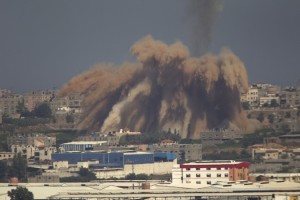
13 July 2014 – I normally live in a world seemingly corralled by algorithms, so when I travel to the Middle East I must bring to my soul an element of chaos to a culture that continually plays its deadly, dystopic sameness. Since Israel launched “Operation Protective Edge” on the Gaza strip on July 8th, at least 120 Gazans have been killed in air strikes, ranging from 75 years to 18 months old. Militants in Gaza launch more rockets, and Israel drops more bombs or sends in ground troops. Eventually enough people die for popular pressure to make the militant groups stop launching rockets, and it all subsides. Until the next time.
Last month I was in the Middle East for 2+ weeks. It was a trip bracketed by a tech conference in Tel Aviv and a tech conference in Amman. I shall write about them in a subsequent post. I added on 2 weeks to this trip, purely as a fact-finding trip of my own in keeping with a personal agenda plus e-discovery work I am doing for the UN. There is an Italian phrase that describes the people (Arabs, Greeks, Italians, etc.) who populate the Mediterranean … “una faccia, una razza” (one face, one race) … that is far too simple an expression but meant to capture a similar set of values, religions, customs, food, etc. across the region. I spend most of my time in and around the Med but not enough in the core of the Middle East and that was my intent.
Although it was my third trip to the area, it felt like my first. I traveled across Israel and all through the West Bank, eating/shopping/talking with people in Ashkelon, Haifa, Jerusalem and Tel Aviv, etc. but also Hebron, Jericho, Nablus and Ramallah. There was one big take-away from that trip, confirmed by recent weeks. I made a statement that “things are certainly better” and was corrected by everybody: “No, things are simply quiet. Here, something can trigger an escalation. Can trigger a low-level conflict that simply escalates”.
And so we have seen. The outrage that accompanied the discovery of the bodies of three kidnapped Israelis and a revenge attack in which a Palestinian teenager was kidnapped and murdered has triggered unconscionable violence.
I am going to write a much longer post over the summer, reflecting on the multitude of conversations I had with journalists, political pundits and just the “everyday” people I encountered who seemed to be careless of hardship and risk and invited me into their homes. I want to air out the brutal geopolitics and the powerful regional and international allies (and foes) that have acted with indifference.
I have even started some very basic Arabic and Hebrew language studies because if ever there was a place where language has dictated events, this is it. Forces have transformed “Palestine” from a homeland to a slogan. Much like everybody knows where America is, but nobody has ever been there, Palestine has become that quintessential illusion. Oh, “reality”: what are you?
Language dictates. The world’s politicians are in full: “Don’t dare criticize Israel lest you be wrongly smeared as an anti-semite mode”. The Israelis find they are no longer the victims but the perpetrators of the current crisis. Yes, Hamas are dreadful hate-filled killers and woe to Israel if they had the wherewithal to carry out their intentions. But the fact remains that it is Israel which has the tanks, bombers, artillery, nuclear warheads and missile defenses of Goliath, while ordinary Gazans had nothing a week ago and even less today, as even hospitals and schools were bombed. These are dreadful tactics.
Ordinarily, this moment would be accompanied by a cascade of international opprobrium from Palestinian supporters, demands for restraint, and perhaps calls from Israel’s own allies to rein in its forces. Yet even as the death toll in Gaza grows from the Israeli campaign there has been relative quiet about the battle. Hamas continues to fires its rockets, hundreds of them, deeper into Israeli territory than ever before, but the normally raucous international chorus has barely made a peep so far.
The international community is totally disinterested. Why? As an Israeli journalist told me “this is a war-wrecked region. Officials and diplomats are exhausted, spread thin, and focused on seemingly bigger problems, as Syria’s civil war grinds on and ISIS continues marauding across Iraq”.
And so it goes.